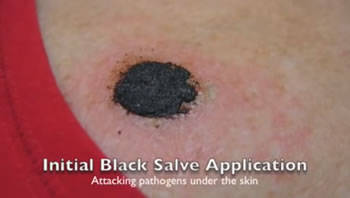Black Salve for Skin Cancer

Black Salve is also known as cansema, black ointment, black drawing salve, cansema salve, black salve for boils, bloodroot paste, cansema ointment, bloodroot salve. The best way you can get Black Salve is to buy the ingredients and make it yourself.
ONE ANSWER TO CANCER (video) is about two cancer salves. One, known as Aldara, doesn’t cure, and has even killed. Yet, it is still legally and enthusiastically prescribed by doctors, and even subsidized by our tax dollars. Aldara nearly killed Elaine Hollingsworth, after she put a small amount on a tiny skin cancer. She has never recovered, nor have thousands of other victims. This is an unspeakable crime. The other cancer salve is safe and effective, and has never harmed anyone, in thousands of years of use. Yet it is illegal, and is suppressed by governments. Why? You know the reason: Big Pharma will lose billions in revenue when the power and safety of the salve becomes widely known.
ONE ANSWER TO CANCER is packed full of amazing testimonials by people who have reclaimed their health. They have eliminated invasive breast cancers, deadly Ewing’s Sarcoma, terminal thyroid cancer, bowel cancer and an array of skin cancers, even large melanomas. In their interviews men and woman describe exactly how they used this natural salve, and have even generously included startling before and after photos.
HOW TO MAKE BLACK SALVE
RECIPE 1
What you need to make a half batch (450g):
25g Bloodroot powder
25g Chaparral powder
25g Galangal powder
25g Graviola powder
12ml DMSO 70%
125g Zinc chloride
250ml Distilled water
25ml+ Vegetable Glycerine
Glass saucepan, wooden spoon, stove
Glass storage jars (enough to hold 450g approximately ie – 5 x 100g jars or 13 x 30g jars)
1. Take 50g each of blood root, chaparral, galangal and graviola, place in a bowl, set aside for use later.
2. Take 500ml distilled water in a glass pan heat resistant
3. Add 250ml zinc chloride to the distilled water, bring to the boil stirring frequently to ensure there are no lumps, use a wooden spoon.
4. Place heat in simmer Add the four dried herbs that are in the bowl, keep stirring until all of the lumps disappear
5. Once you have a smooth consistency add 25ml of DMSO whilst still stirring
6. Next add 25ml of glycerin and continue stirring
7. Simmer for 15 minutes
8. Take off the boil and leave for 2 days to cure and cool then place in sealed containers and refrigerate until needed
RECIPE 2
-
One tablespoon each of powdered bloodroot and polk root
-
1 tablespoon zinc chloride
-
DMSO (5 drops per 4 ounces of salve)
-
One tablespoon Charcoal (optional)
-
Vitamin A, 10,000 IU (more vitamin A can be added up to 200,000 IU.
-
Pine tar (one teaspoon to one tablespoon)
-
Pascalite clay
Dissolve the zinc chloride in one to two tablespoons of warm distilled water. Use only enough water to dissolve. Set aside. (Be careful with this, do not get it directly on skin and keep locked from children), and do not breathe fumes.
Mix bloodroot, charcoal and polk root in a separate container with a little cooking oil, just enough to cover the herbs, mix well. Carefully add the zinc chloride and water mixture, stirring well. Gently heat the mixture in double boiler, stirring constantly for 30 minuets Remove from heat, stir well, let cool, add DMSO.
Next, mix one teaspoon to one tablespoon at a time of the Pascalite clay to the bloodroot mixture until you have a smooth, thick paste that is easily spreadable. Do not put too much of the clay into the mixture or it will be lumpy. If the mixture is too thick, add a few drops of oil or water to thin. If too thin, add a small amount more of the clay. The clay is important in this recipe since it helps to draw out impurities from the skin. If you do not have clay and need to make the paste right away, it can be thickened with flour.
You will only need to apply this paste once. Apply to the cancer, cover with gauze and tape (band aids will not work), leave undisturbed for 12 hours. At the end of 12 hours, wash area with soap and water, and then clean with hydrogen peroxide. This can be applied every 2-3 days if you feel you need to, usually one application is all that is needed for very small cancers. The cancer will drop off by itself in one to five weeks. Your may have pain, fever, stinging, intense itching or burning; this is normal. You can apply some chickweed salve to the area for the itching, but do not use anything else such as healing salves. Healing salves will heal up the area before it has time to kill the cancer.
RECIPE 3
Cansema is a natural skin cancer treatment. The active ingredients of Cansema are Zinc, bloodroot, and chaparral. It can be ordered from Alpha Omega Labs in the Bahamas. There is a Recipe available.
This is a recipe for a black paste very similar to the Cansema. But this is a preferred paste for melanoma and all suspect skin cancer like lesions. This paste also has worked well for all manner of cancers provided that they have become exposed to or close to the surface of the skin.
1/2 cup powdered Blood Root (Sanguinaria Canadensis)
1/2 cup Zinc Chloride, crystals or liquid
1/2 cup common white flour
1 1/2 cup warm water
100ml Chaparral extract or 100gm of powdered Chaparral (Larrea mexicana)
Pre-mix all but the water, thoroughly, before adding to the water. Using a stainless steel double boiler. Put in water, then stir in the other ingredients. Stir in well using a wooden spoon. Cook for thirty minutes over boiling water, stirring constantly. Application is much the same as Cansema. Apply a thin layer (2-3mm) of the paste over the affected area and cover for 24 hours. Then remove the covering but do not disturb the lesion at all, do not attempt to pull the cancer out at any time, it should fall out in 10 days or so. Some people with sensitive skin put Vaseline around the cancer so that the paste does not irritate the skin.
A population-based case-control study was used to evaluate the relationships between citrus peel use and black tea intake and squamous cell carcinoma (SCC) of the skin. Moreover, we assessed the independent and interactive effects of citrus peel and black tea in the development of SCC.
Results
Hot and iced teas were consumed by 30.7% and 51.8% of the subjects, respectively. Peel consumption was reported by 34.5% of subjects. Subjects who reported consumption of both hot black tea and citrus peel had a significant marked decrease (OR= 0.22; 95% CI = 0.10 – 0.51) risk of skin SCC.
Conclusion
These results indicate that both citrus peel use and strong (hot) black tea have independent potential protective effects in relation to skin SCC. https://www.ncbi.nlm.nih.gov/pmc/articles/PMC45584/ Of particular interest are the accumulating data that reflect similar potential health benefits associated with both the epicatechins of green tea and the theaflavins of black tea [10,11]. d-Limonene, which comprises > 90% of citrus peel oil, has demonstrated chemo-preventive activity against a variety of chemically induced rodent cancers
** Hot black tea with lemon peel**
Lemons are a great source of Vitamin C which is a powerful antioxidant. Lemons also have a compound called limonene which has documented anticancer properties. When the peel of lemons is combined with hot black tea, protection against skin cancer dramatically increases.
In 2001 the BBC News cited a study from the University of Arizona in which researchers concluded that: “Citrus peel in the tea was found to have more than a 70% reduced risk for skin squamous cell carcinoma (SCC), whereas black tea alone meant a 40% reduction.”
It also seemed to matter that the tea was hot and not cold. The researchers found that iced drinks were less effective than the hot beverages as they were more likely to be diluted.
Some sources say that one tablespoon a week of the grated lemon peel into your hot black tea is all you need to make a significant difference.
Tea tree oil may be used in future as a fast, cheap, safe and effective treatment for non-melanoma skin cancers and precancerous lesions, according to researchers at The University of Western Australia.
A three-year study by UWA’s Tea Tree Oil Research Group has found solid tumours grown under the skin in mice and treated with a tea tree oil formulation causes inhibition of tumour growth and tumour regression within a day of treatment. Within three days, the tumours cannot be detected.
Unlike other clinically approved skin cancer chemotherapies, which have long treatment times of three to 16 weeks and can cause nausea and flu-like symptoms, the tea tree oil formulation only produces mild skin irritation which disappears within days of treatment finishing.
“We believe the formulation is crucial to prevent the evaporation and increase the penetration of tea tree oil through the skin,” Dr Greay said.
“Clinical trials in human patients with precancerous lesions or skin cancers must be conducted to test the efficacy and safety of our tea tree formulations before any treatment will be available to the public.
Melaleuca alternifolia (tea tree) oil (TTO) applied topically in a dilute (10%) dimethyl sulphoxide (DMSO) formulation exerts a rapid anti-cancer effect after a short treatment protocol. Tumour clearance is associated with skin irritation mediated by neutrophils which quickly and completely resolves upon treatment cessation. To examine the mechanism of action underlying the anti-cancer activity of TTO. Immune cell changes in subcutaneous tumour bearing mice in response to topically applied TTO treatments were assessed by flow cytometry and immunohistochemistry. Direct cytotoxicity of TTO on tumour cells in vivo was assessed by transmission electron microscopy. Neutrophils accumulate in the skin following topical 10% TTO/DMSO treatment but are not required for tumour clearance as neutrophil depletion did not abrogate the anti-cancer effect. Topically applied 10% TTO/DMSO, but not neat TTO, induces an accumulation and activation of dendritic cells and an accumulation of T cells. Although topical application of 10% TTO/DMSO appears to activate an immune response, anti-tumour efficacy is mediated by a direct effect on tumour cells in vivo. The direct cytotoxicity of TTO in vivo appears to be associated with TTO penetration. Future studies should focus on enhancing the direct cytotoxicity of TTO by increasing penetration through skin to achieve a higher in situ terpene concentration. This coupled with boosting a more specific anti-tumour immune response will likely result in long term clearance of tumours.


